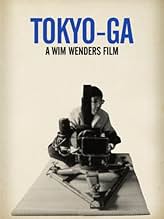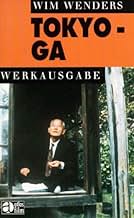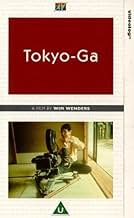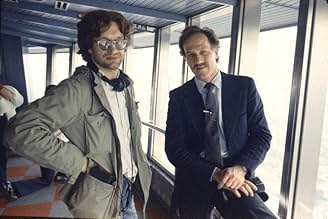IMDb-BEWERTUNG
7,3/10
3817
IHRE BEWERTUNG
Bewegt durch das Werk des Regisseurs Yasujirô Ozu, reist Wim Wenders nach Japan auf der Suche nach dem Tokio, das in Ozus Filmen zu sehen ist.Bewegt durch das Werk des Regisseurs Yasujirô Ozu, reist Wim Wenders nach Japan auf der Suche nach dem Tokio, das in Ozus Filmen zu sehen ist.Bewegt durch das Werk des Regisseurs Yasujirô Ozu, reist Wim Wenders nach Japan auf der Suche nach dem Tokio, das in Ozus Filmen zu sehen ist.
Empfohlene Bewertungen
I first went to Japan in 1986 as a high school exchange student. I had been studying about Japan for the past 6 years and was very excited to finally go there to see it in person. Wim Wenders was in a similar situation. He had fallen in love with a particular Japanese film-maker Ozu Yasujiru. Wim had been influenced from an early age by Ozu's work, and he decided to go to Japan while in the middle of making "Paris, Texas." During the break in the making of the film in Los Angeles, Wim boarded a 747 and flew across the Pacific to Tokyo, a place he had never been to before. What we get to see when we watch this film, is not only an interview with the cameraman that worked for Ozu for 25 years, but also Wim's personal discovery of Japan. Much of the film is just straight documentary-type footage accompanied with some pretty weird music. Riding in a taxi at night. Riding in a train at night. Following a little boy who is too tired to walk in the underground shopping mall with his mom, and decides to just sit down. The Cherry Blossom Festival picnics in Tokyo, the dancers at Harajuku on Sundays. A particularly fascinating scene is of a company that manufactures the wax food models you see outside most restaraunts in Japan. Overall, a wonderful film for anyone who loves Japan or is just interested in it. I rate this film among Wim's best works. If you can find it, rent it.
I'm not much attuned to Wenders or Ozu (whom Wenders hopes to rediscover with this). But I am very much attuned to Japan and their entire cosmology - their cultural images form one of the most sophisticated readings of the world. Their tea-house and the creative process that surrounds it is one of my three most valuable narratives (meant loosely).
It is with Ozu that Wenders is blessed with a unique entry into that entire cosmology. Sure, he comes to Japan consciously looking for that entry, but he is so busy looking for it in the most superficial way that he completely misses. Where is Ozu's Japan? Obviously gone, with time and modernity. The sprawling megapolis refutes the quiet, provincial life of Ozu's cinema, but that's hardly worth the insight.
That uniquely fortunate entry which Wenders misses, Ozu transmits from beyond the grave. It is actually inscribed on his gravestone, where in place of any other signifier we find the ideogram for "Mu", meaning "not" or "nothing", which is at the heart of the koan on emptiness - known as the "MU!" koan - so important in the teachings of the Rinzai Zen school.
Wenders being so utterly a stranger in all of this, so deeply embedded in his Western worldview, he starts rattling off a painfully flaccid diatribe on our perception of reality, as shaped by cinema and otherwise. Pontificating, banal notions that 'everything we see is ours', which is another example that filmmakers, however talented with images, are usually very poor commentators on their chosen field.
He is so completely out-of-tune with the importance of Ozu's gravestone lesson - which should have been his portal of understanding of the Japanese world - that he concludes said diatribe with the notion that cinema now is empty, "mu", whereas in Ozu's films it teemed with life and truth. The idea that emptiness is the true essence of form, and that by extension Ozu's ethos flows from that assurance, completely escapes him.
Had he understood that, he could have perhaps unlocked the meaning of the images of Japanese life he captures; the group of teenagers in a park drenched in the fashions and sounds of 50's America, or the food artists preparing from wax, in tremendous detail of shape and color, exact replicas of dishes to be displayed in a restaurant's window-shop. It is all about this concentrated, joyous work in form, as flowing from an empty-centeredness. So even though the kids dressed in rockabilly attire appear to be rebelling against everything that is culturally Japanese, the very expression of that rebellion - the precise, concentrated movements, the infatuation with movement itself - brings them at the heart of it.
But Wenders being Wenders, when faced with the players in an arcade parlor quietly lost in their noisy game of pachinko, he can only think that they are subsumed automaton-like by the machine. All these are merely the scenes of some indecipherable cultural gap for him.
So the essay on cinematic reality is really poor, and he even chances to meet Chris Marker on a small bar called "La Jetee", then working on Sans Soleil about similar stuff. With the hindsight of what Soleil would grow to be, this seems even smaller. Elsewhere he is reunited so far from Germany with Herzog, in suit and tie himself so far removed from his jungles. He goes on about his own thing about pure images, which in his films always flow out from the physical landscape. So it's natural that he thinks those images are impossible to find in the artifice of modern Tokyo - yet I posit that the fascinating work of the food artists constructing replicas of tofu and icecream is exactly the pure image. But not Wagnerian enough for Herzog.
What is left, and what is usually really good with Wenders, is the beauty of images tied into space. Here the electric night of the big city. He's at least attuned to the visible fabric, with a natural eye for how to synthesize it into a pervasive mood, even when he's pretty daft about the mechanisms invisible to the eye that control it. As a filmmaker he looks wonderfully, but doesn't really see.
So the stuff about Ozu don't interest me overmuch and I haven't commented on that, but everyone who is a fan should see the interview with Ozu's longtime cameraman. He reveals precious tidbits of the working ethos that informs his work. We see him enact how he setup those tatami shots for Ozu.
It is with Ozu that Wenders is blessed with a unique entry into that entire cosmology. Sure, he comes to Japan consciously looking for that entry, but he is so busy looking for it in the most superficial way that he completely misses. Where is Ozu's Japan? Obviously gone, with time and modernity. The sprawling megapolis refutes the quiet, provincial life of Ozu's cinema, but that's hardly worth the insight.
That uniquely fortunate entry which Wenders misses, Ozu transmits from beyond the grave. It is actually inscribed on his gravestone, where in place of any other signifier we find the ideogram for "Mu", meaning "not" or "nothing", which is at the heart of the koan on emptiness - known as the "MU!" koan - so important in the teachings of the Rinzai Zen school.
Wenders being so utterly a stranger in all of this, so deeply embedded in his Western worldview, he starts rattling off a painfully flaccid diatribe on our perception of reality, as shaped by cinema and otherwise. Pontificating, banal notions that 'everything we see is ours', which is another example that filmmakers, however talented with images, are usually very poor commentators on their chosen field.
He is so completely out-of-tune with the importance of Ozu's gravestone lesson - which should have been his portal of understanding of the Japanese world - that he concludes said diatribe with the notion that cinema now is empty, "mu", whereas in Ozu's films it teemed with life and truth. The idea that emptiness is the true essence of form, and that by extension Ozu's ethos flows from that assurance, completely escapes him.
Had he understood that, he could have perhaps unlocked the meaning of the images of Japanese life he captures; the group of teenagers in a park drenched in the fashions and sounds of 50's America, or the food artists preparing from wax, in tremendous detail of shape and color, exact replicas of dishes to be displayed in a restaurant's window-shop. It is all about this concentrated, joyous work in form, as flowing from an empty-centeredness. So even though the kids dressed in rockabilly attire appear to be rebelling against everything that is culturally Japanese, the very expression of that rebellion - the precise, concentrated movements, the infatuation with movement itself - brings them at the heart of it.
But Wenders being Wenders, when faced with the players in an arcade parlor quietly lost in their noisy game of pachinko, he can only think that they are subsumed automaton-like by the machine. All these are merely the scenes of some indecipherable cultural gap for him.
So the essay on cinematic reality is really poor, and he even chances to meet Chris Marker on a small bar called "La Jetee", then working on Sans Soleil about similar stuff. With the hindsight of what Soleil would grow to be, this seems even smaller. Elsewhere he is reunited so far from Germany with Herzog, in suit and tie himself so far removed from his jungles. He goes on about his own thing about pure images, which in his films always flow out from the physical landscape. So it's natural that he thinks those images are impossible to find in the artifice of modern Tokyo - yet I posit that the fascinating work of the food artists constructing replicas of tofu and icecream is exactly the pure image. But not Wagnerian enough for Herzog.
What is left, and what is usually really good with Wenders, is the beauty of images tied into space. Here the electric night of the big city. He's at least attuned to the visible fabric, with a natural eye for how to synthesize it into a pervasive mood, even when he's pretty daft about the mechanisms invisible to the eye that control it. As a filmmaker he looks wonderfully, but doesn't really see.
So the stuff about Ozu don't interest me overmuch and I haven't commented on that, but everyone who is a fan should see the interview with Ozu's longtime cameraman. He reveals precious tidbits of the working ethos that informs his work. We see him enact how he setup those tatami shots for Ozu.
Wim Wenders' praising, honest, confessional, hurriedly made and rather superficial love letter to the great Japanese filmmaker (and essential influence on WW's work) Yasujiro Ozu. This documentary intermingles some footage of Ozu's Tokyo Monogatari (in a bad copy, which is really a disservice to Ozu's art!); highly reverent interviews with Ozu's signature actor Chishu Ryu and longtime cameraman Yuharu Atsuta, both in their eighties but remarkably keen; and Wenders' own discovery (it's his first time there) of a high-tech, overcrowded, Americanized Tokyo, radically different from WW's preconceived image of an almost provincial post-war Tokyo that he had idealized through Ozu's films.
There are beautiful images by great cameraman Ed Lachman, especially the night shots; but overall it's pretty much familiar territory: trains (old trains, new trains, bullet trains), the overcrowded subway, the concrete jungle, the neon signs, the "copycat" fetishism (fake food, fake golf, fake rock'n'roll), baseball games, the video game mania, Japanese politeness, Japanese formality, Japanese impenetrability. It's a traveling journal, narrated by WW himself, where insightful and obvious remarks come in turns. It's a film with too few highlights (Atsuta's interview, Werner Herzog's maniac speech about his search for "clean, pure images"), and inevitably superficial: like all big towns, Tokyo can't be covered and deciphered by a first-timer; and like all great artists, Ozu's unique universe can't be grasped by a couple of interviews, anecdotes or images. When WW talks about Ozu's art, he's of course telling us about himself and his own cinema.
There's a telling sequence, where WW gets to meet French filmmaker Chris Marker in a Tokyo night-bar called "La Jetée" (the title of Marker's landmark 1962 science-fiction/photo-poem short). Marker - who spent considerable time in Japan over the years -- put Tokyo and Japanese culture at the center of one of the most brilliant personal essays/ journals ever filmed, the incomparable "Sans Soleil" (1982). At one point, WW mentions that "Sans Soleil" is filled with "images of Japan not allowed to foreigners like me". Hence my suggestion: if you want to know more about Ozu, watch his films; if you want to see a revealing, knowledgeable essay by a Westerner on Japan, pass on "Tokyo-Ga" and try "Sans Soleil" instead; if you want a deeply insightful look into WW's work, read the great essay on WW "Eyes Can't Be Bought" by Peter Buchka.
There are beautiful images by great cameraman Ed Lachman, especially the night shots; but overall it's pretty much familiar territory: trains (old trains, new trains, bullet trains), the overcrowded subway, the concrete jungle, the neon signs, the "copycat" fetishism (fake food, fake golf, fake rock'n'roll), baseball games, the video game mania, Japanese politeness, Japanese formality, Japanese impenetrability. It's a traveling journal, narrated by WW himself, where insightful and obvious remarks come in turns. It's a film with too few highlights (Atsuta's interview, Werner Herzog's maniac speech about his search for "clean, pure images"), and inevitably superficial: like all big towns, Tokyo can't be covered and deciphered by a first-timer; and like all great artists, Ozu's unique universe can't be grasped by a couple of interviews, anecdotes or images. When WW talks about Ozu's art, he's of course telling us about himself and his own cinema.
There's a telling sequence, where WW gets to meet French filmmaker Chris Marker in a Tokyo night-bar called "La Jetée" (the title of Marker's landmark 1962 science-fiction/photo-poem short). Marker - who spent considerable time in Japan over the years -- put Tokyo and Japanese culture at the center of one of the most brilliant personal essays/ journals ever filmed, the incomparable "Sans Soleil" (1982). At one point, WW mentions that "Sans Soleil" is filled with "images of Japan not allowed to foreigners like me". Hence my suggestion: if you want to know more about Ozu, watch his films; if you want to see a revealing, knowledgeable essay by a Westerner on Japan, pass on "Tokyo-Ga" and try "Sans Soleil" instead; if you want a deeply insightful look into WW's work, read the great essay on WW "Eyes Can't Be Bought" by Peter Buchka.
I love Wim Wenders and most of his films that I have seen. I love and venerate the films of the Japanese master Yasujirô Ozu. 'Tokyo-Ga', the documentary realized in 1985 by Wenders researching the echoes of the works of the great Japanese director 20 years after his death, trying to find what was left of the landscape, characters and spirit of his movies, was of great promise to me. I confess however that one plus one in this case did not make more than two or even equal two. The film, which I have seen in a retrospective of Wenders' earlier movies that started at the local cinematheque slightly disappointed me.
'Tokyo-Ga' is conceived as a travel journal with a definite goal. Wenders tells it in the opening, actually we will hear his voice for the whole duration of the film, even relaying and translating to German what the persons he interviews have to say. He flies to Japan to find what is left of the landscape of Tokyo that inspired the films of Ozu. On the plane he sees a movie and makes an ironic remark about commercial Hollywood movies, while we have a glimpse from ''On Golden Pond' actually not a bad film at all. The film seems to be a chronological journal of his first encounter with Japan. He meets with people who worked with Ozu and interviews them. He films almost everything he encounters - the metropolitan jungle of Tokyo in the 1980s (still looking futuristic even today), kids playing baseball in a cemetery, trains, many trains, Japanese men fascinated with electronic games, young people dancing rock in a park, a factory were the plastic models that represent dishes in Japanese restaurants are created. He meets fellow film makers and discusses cinema and the Japanese landscape with them. Some of the scenes are related vaguely with Ozu's films (the games, the trains). Some other seem completely unrelated. Wenders had come too late in his search. The spirit of Ozu is no longer there, not in the landscape in any case. It's another city, another country, another world. The process of change, of americanization, of fading out of the Japanese culture described by Ozu in his post-war movies had been completed.
I mostly liked the two interviews in the film - with one of his prefered actors and with the camera man. They brought back the personality of the great film maker, and also defined very well the relationship between the film director and his collaborators. The two were keeping for him the respect due to a father and master of his profession. At the same time we get from both the image of a creator who planned every detail of his films rigurously, who knew exactly why and how the film will be made, who had reached the genial simplicity of his expression by rigurous thinking and permanent cizeling of his artistic tools. Wenders' movie 'Tokyo-Ga' is very different, it's almost spontaneous filming as things happen. We can feel the deep respect of Wenders for Ozu, but in order to understand the art of the Japanese master there is no alternative but seeing his films.
'Tokyo-Ga' is conceived as a travel journal with a definite goal. Wenders tells it in the opening, actually we will hear his voice for the whole duration of the film, even relaying and translating to German what the persons he interviews have to say. He flies to Japan to find what is left of the landscape of Tokyo that inspired the films of Ozu. On the plane he sees a movie and makes an ironic remark about commercial Hollywood movies, while we have a glimpse from ''On Golden Pond' actually not a bad film at all. The film seems to be a chronological journal of his first encounter with Japan. He meets with people who worked with Ozu and interviews them. He films almost everything he encounters - the metropolitan jungle of Tokyo in the 1980s (still looking futuristic even today), kids playing baseball in a cemetery, trains, many trains, Japanese men fascinated with electronic games, young people dancing rock in a park, a factory were the plastic models that represent dishes in Japanese restaurants are created. He meets fellow film makers and discusses cinema and the Japanese landscape with them. Some of the scenes are related vaguely with Ozu's films (the games, the trains). Some other seem completely unrelated. Wenders had come too late in his search. The spirit of Ozu is no longer there, not in the landscape in any case. It's another city, another country, another world. The process of change, of americanization, of fading out of the Japanese culture described by Ozu in his post-war movies had been completed.
I mostly liked the two interviews in the film - with one of his prefered actors and with the camera man. They brought back the personality of the great film maker, and also defined very well the relationship between the film director and his collaborators. The two were keeping for him the respect due to a father and master of his profession. At the same time we get from both the image of a creator who planned every detail of his films rigurously, who knew exactly why and how the film will be made, who had reached the genial simplicity of his expression by rigurous thinking and permanent cizeling of his artistic tools. Wenders' movie 'Tokyo-Ga' is very different, it's almost spontaneous filming as things happen. We can feel the deep respect of Wenders for Ozu, but in order to understand the art of the Japanese master there is no alternative but seeing his films.
Tokyo-Ga is a 1985 documentary film directed by Wim Wenders about filmmaker Yasujiro Ozu. Wenders travels to Japan and narrates the movie as he explores the world of Ozu, alternating scenes where he observes Japan and culture with interviews with crew and cast-members from Ozu's films. Wim Wenders says, "If in our century something sacred still existed
if there were something like a sacred treasure of the cinema, then for me that would have to be the work of the Japanese director, Yasujiro Ozu. He made fifty-four films. Silent films in the Twenties, black-and-white films in the Thirties and Forties, and finally color films until his death on December 12th, 1963, on his sixtieth birthday. As thoroughly Japanese as they are, these films are, at the same time, universal. In them, I've been able to recognize all families, in all the countries of the world, as well as my parents, my brother and myself. For me, never before and never again since has the cinema been so close to its essence and its purpose: to present an image of man in our century, a usable, true and valid image, in which he not only recognizes himself but from which, above all, he may learn about himself. Ozu's work does not need my praise and such a sacred treasure of the cinema could only reside in the realm of the imagination. And so, my trip to Tokyo was in no way a pilgrimage. I was curious as to whether I still could track down something from this time, whether there was still anything left of this work. Images perhaps, or even people
Or whether so much would have changed in Tokyo in the twenty years since Ozu's death that nothing would be left to find.
Wusstest du schon
- Zitate
Wim Wenders: It felt good just to look out the window. If only it were possible to film like that, I thought to myself, like when you open your eyes sometimes just to look without wanting to prove anything.
- VerbindungenFeatured in Das Meer das denkt (2000)
Top-Auswahl
Melde dich zum Bewerten an und greife auf die Watchlist für personalisierte Empfehlungen zu.
- How long is Tokyo-Ga?Powered by Alexa
Details
- Erscheinungsdatum
- Herkunftsländer
- Sprachen
- Auch bekannt als
- Tokyo Ga
- Drehorte
- Produktionsfirmen
- Weitere beteiligte Unternehmen bei IMDbPro anzeigen
Zu dieser Seite beitragen
Bearbeitung vorschlagen oder fehlenden Inhalt hinzufügen
























